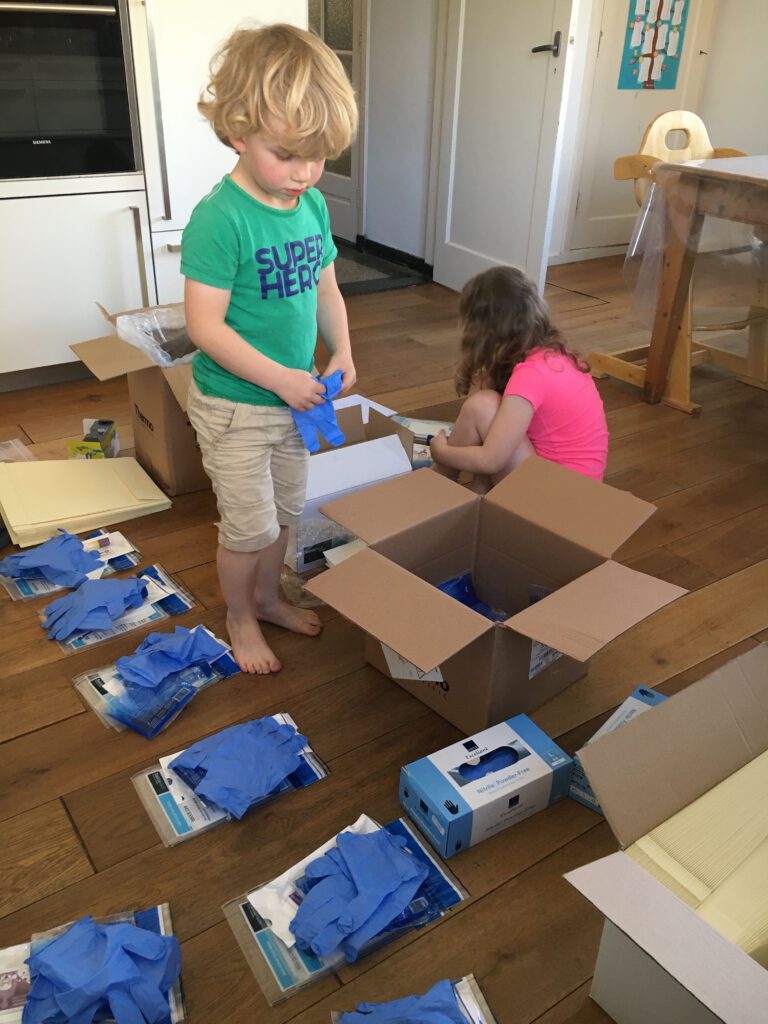
While health care professionals are busy caring for and treating COVID-19 patients, researchers are currently not allowed in their research institutes. Especially hospitals (where many research institutes are located) are extra careful not to create risks for personnel and patients. The researchers working in the Eat2BeNICE consortium normally work in these environments. They have been working from home for a couple of weeks and probably will continue to do so for another couple more weeks to come.
Like all people working from home, researchers have to be creative and find adaptive ways to proceed their work. Many ongoing studies are therefore on hold as participants cannot visit the facilities to report on their symptoms, deliver blood or perform any of the measurements that are usually done for the visits. However, in some cases measurements can proceed; online questionnaires on e.g. mental health can replace the physical visits where possible. Also stool measurements can still be done, as no physical contact is needed between researcher and participant, and any pathogenic particles are de-activated by the conserving buffer in the tube. The collection kits can be send by post and returned in the same way with the specimen. This is good news especially for studies that have started now rather than paused. These are studies assessing the psychological effects of the corona-crisis, see for example the Dynamore study.
The change in daily routines affects everybody in a different way, some easily adapt and others are dysregulated by it. For example, ADHD symptoms can surge by a lack of, or sudden change in structure. Social isolation can trigger melancholic feelings. Also the insecurity about when society will function as before is a stressor for a lot of people. This is ‘good’ news for those researchers that investigate the effects of stress. Normally they mimic stress-inducing circumstances in the laboratory (Ferreira et al. 2019). For instance by asking participants to give a presentation in front of an unsympathetic audience, or by letting participants learn a game with wrong or misleading instructions. The corona crisis is in this way a ‘natural stressor’, which has consequences on mental health. Similar research has been done previously for other real-life traumatic events e.g. looking at development of post-traumatic stress disorder after the events on 09-11-2001 (Lowell et al. 2018). We can learn from the current and previous natural disasters; realizing crises where overcome before can motivate us to do our part in the containment of the COVID-19 virus and remain mentally healthy in the process. An international team of researchers has recently summarized insights from natural disasters and social and behavioural psychology experiments (Bavel et al. 2020). They highlight the importance of communicating measures and prevent chaos, how we can combat fake news and how we can increase cooperation and better manage stress.
As one of the goals of our Eat2BeNICE consortium is to understand the interplay between gut health and mental health, our German colleagues have started extra measurements to look into the effect of the corona crisis. They ask participants to report on their feeling and also donate a stool sample. These measurements allow us to determine whether responding well to stressors due to the corona crisis is associated with, for example, lower diversity in types of gut bacteria or a specific combination of gut bacteria that promote optimal immune functioning. Setting up the logistics of this study requires creativity of the supporting researchers, as all these preparations should be done from home. Our lab technician found a good solution for this, keeping her kids busy by having them assist in the preparation of stool sample collection kits. With solutions like this, we will reach the end of this crisis in a mentally sane condition 🙂

Read more about the ongoing studies
Dynamore: https://www.research.net/r/DynaCORE
Lora study (in German): https://lora-studie.de/
